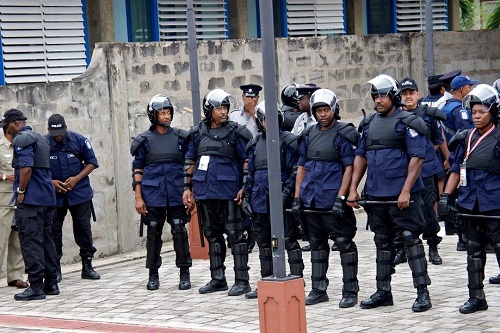Georgia Popplewell photo
By
Ricardo Swire
The Caribbean archipelago’s national security is in a period of metamorphosis. Concurrently the Organization of American States (OAS) General Assembly has publicly promoted the importance of adopting a multidimensional approach to hemispheric security. Immigration statistics recorded the US Passport’s popularity decline, from second to third most powerful travel document universally for visa free movement, CARICOM member Trinidad & Tobago being number one of four most popular passports regionally.
Land of the “Scarlet Ibis” passport holders access 103 countries globally without a visa. Across the waters on the island of Jamaica traces of terrorism were unearthed. On Wednesday May 2, 2018 an American judge signed the extradition warrant for a fifty-two year old Jamaican Muslim Imam, charged with terrorist activity. In December 2016 a New York Police Department’s (NYPD) one month counter-terrorism operation entrapped the Jamaican extremist via emails, text and video calls.
Initially, an undercover NYPD detective fostered a cyber-relationship with the Islamic State (IS) Caribbean recruiter. He invited the US law enforcer to view IS propaganda featured on the dark net’s Tor Browser. The Jamaican Imam also escorted other undercover NYPD detectives to the Middle East. On arrival the American lawmen were introduced to his “contact” northeast of the Euphrates River in Raqqa, Syria. In August 2017 the Jamaican extremist was arrested on the island and transported to America.
Caribbean airports and seaports are national facilities where large numbers of visitors assemble. In order to police such national operations’ vulnerabilities and threats, individual islands depend on inter-regional cooperation and continuous assistance from external partners. For an extended period CARICOM intelligence officials have contested “breeder documents” related to the process of obtaining local passports, a regional national security loophole, based on the reality there are no common or secure, individually compiled birth and death certificates systems.
In December 2013 an Iranian detained in Canada, as “special envoy to Turkey and Azerbaijan,” traveled on an official diplomatic St Kitts & Nevis passport. The Iranian purchased his CARICOM travel document for US$1 million, through St Kitts & Nevis’ Citizenship by Investment Program (CIP). Holders of such passports can travel to one hundred and thirty-two countries visa free. Shoddy Citizenship by Investment Program management and substandard antecedents, with provided “sweetners,” have promoted visa free regional and Commonwealth travel.
On November 22, 2014 Canada imposed visa requirements for St Kitts & Nevis nationals. Kittians now travel to one less country than Commonwealth neighbor Antigua & Barbuda’s one hundred and thirty-two without a visa. CIP governmental enticements make Caribbean islands magnets for radical Islamic State or Daesh expansion. Trends show although IS remains focused on Iraq and other Middle Eastern enemies, the Muslim extremist organization has dedicated resources to developing an international strategy.
In 2015 the military General in charge of US Southern Command alarmed about operational and financial overlap, between Caribbean criminals and global terrorist networks. Despite a global media quiet recent cyber evidence showed an expanded Daesh “Department of External Attack Planning.” Latin America’s tri-border area (TBA), aka “The Triple Frontier,” excels in the illegal drugs/gun trades, money laundering and corruption businesses. All part of logistics facilitation and sanctuaries provided to terrorists. Puerto Iguazu in Argentina, Ciudad Del Este in Paraguay and Foz do Iguacu in Brazil, have lucrative drug smuggling activity and money laundering centers.
Such territories are revenue generators for transnational criminal organizations and available support sources for terrorist groups. Regional intelligence patterns show the “Darien Gap,” or land between Colombia and Panama, plus western Venezuela and north-western Brazil, as active staging grounds for insurgent and paramilitary organizations. The Venezuelan free trade zone on Margarita Island doubles as accommodation for Hezbollah fundraisers. Terrorist groups are linked to Suriname’s weapons trafficking cartels. Both Guyana and French Guyana accommodate Hezbollah’s fraud links and activists.
The US 1267 Committee and Al-Qaida/Taliban Sanctions Monitoring Team interact closely with Trinidad & Tobago’s (T&T) counter-terrorism intelligence officials. The Monitoring Team subtly advised during the Twin Island Republic’s Yasin Abu Bakr 1990 attempted coup d’état. The Monitoring Team report noted the T&T Muslim cleric and insurrectionist was associated with individuals or entities named on the “Consolidated List.” The June 2, 2007 arrests of several Trinidadians, involved in a terror plot to attack John F. Kennedy Airport in New York, raised worldwide awareness of the Caribbean’s emanated threat potential.
The unconventional activity brought heightened universal scrutiny. A threat of terrorist cells developing across the Caribbean was tested. Such occurrences highlighted CARICOM’s potential as base for an opposing power to launch attacks against the US. In one CARICOM neighborhood domestic law enforcement personnel, directed by international intelligence updates, intercepted three Syrian nationals on the Dutch island St Maarten, the trio arriving on the Caribbean island, travelling via Haiti, using Greek passports.
Ricardo Swire
Ricardo Swire is the Principal Consultant at R-L-H Security Consultants & Business Support Services and writes on a number of important issues.



No Comments Yet!
You can be first to comment this post!